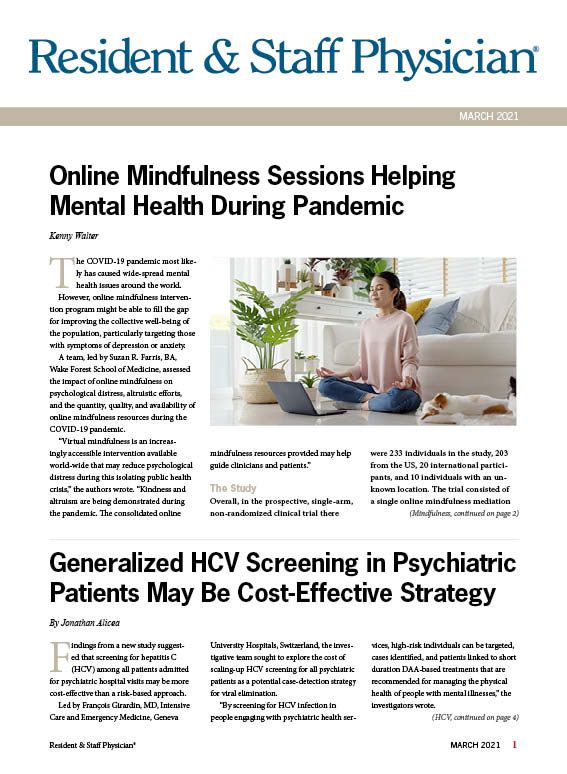Publication
Article
Resident & Staff Physician®
Online Mindfulness Sessions Helping Mental Health During Pandemic
Author(s):
Sessions show promise helping alleviate stress and concern for COVID-19.

The COVID-19 pandemic most likely has caused wide-spread mental health issues around the world.
However, online mindfulness intervention program might be able to fill the gap for improving the collective well-being of the population, particularly targeting those with symptoms of depression or anxiety.
A team, led by Suzan R. Farris, BA, Wake Forest School of Medicine, assessed the impact of online mindfulness on psychological distress, altruistic efforts, and the quantity, quality, and availability of online mindfulness resources during the COVID-19 pandemic.
“Virtual mindfulness is an increasingly accessible intervention available world-wide that may reduce psychological distress during this isolating public health crisis,” the authors wrote. “Kindness and altruism are being demonstrated during the pandemic. The consolidated online mindfulness resources provided may help guide clinicians and patients.”
The Study
Overall, in the prospective, single-arm, non-randomized clinical trial there were 233 individuals in the study, 203 from the US, 20 international participants, and 10 individuals with an unknown location. The trial consisted of a single online mindfulness mediation session, as well as pre- and post-session surveys.
The investigators sought main outcomes of mindfulness session helpfulness, online platform effectiveness, and immediate pre- to post-session changes in momentary stress, anxiety, and COVID-19 concern, as well as qualitative themes representing how individuals are helping others during the pandemic and the absolute changes in quantity of mindfulness-oriented web content and free online mindfulness resource availability between May-August 2020.
Results
The majority of participants found the online mindfulness therapy beneficial and the electronic platform effective for practicing mindfulness (89%; 95% CI, 82-93%). This resulted in decreased momentary anxiety (76%; 95% CI, 69-83%), stress (80%; 95% CI, 72-86%), and COVID-19 concern (55%; 95% CI, 46-63%) (P <0.001 for each measure.
"We are all born with the capacity for mindfulness," Rebecca Erwin Wells, M.D., M.P.H., associate professor of neurology at Wake Forest School of Medicine, part of Wake Forest Baptist Health, and principal investigator for this study, said in a statement. "It can help reduce stress and anxiety, and mindfulness meditation practice can help enhance this ability."
The respondents also reported a number of ways they have helped others during the pandemic, including following public health guidelines, conducting acts of service and connection, and helping oneself in hopes of helping others.
In addition, the search results of the phrase “mindfulness + COVID” increased by 52% between May and August 2020. Also, 73% of Academic Consortium for Integrative Medicine and Health member websites offer free online mindfulness resources.
The Future
While additional research is needed, the results of the study do show the promise in utilizing mindfulness sessions should there be another pandemic in the future.
"We found that online mindfulness interventions may improve psychological health at a time of uncertainty. We were also encouraged by the survey responses, which showed a sense of connectedness and a desire to help others," Wells said. "Helping others during the pandemic demonstrates the beautiful capacity of the human spirit to find positivity despite the extraordinary negative circumstances."
The study, “Online Mindfulness May Target Psychological Distress and Mental Health during COVID-19,” was published online in Global Advances in Health and Medicine.





